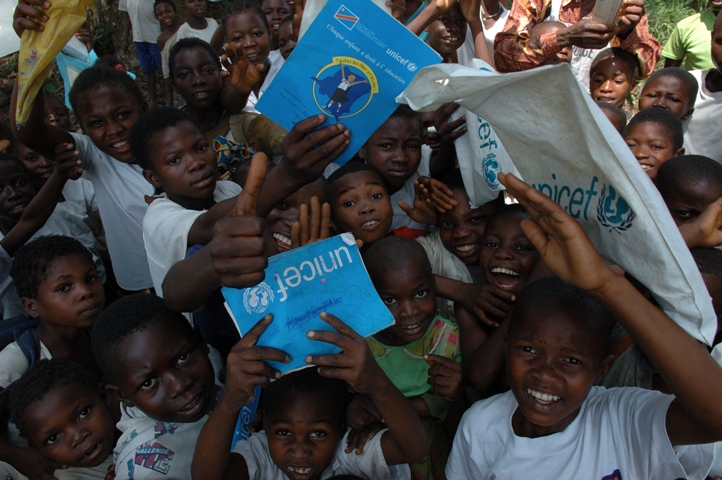Haiti: UNICEF reports nine-fold increase in violence targeting schools

Acts of armed violence targeting schools in Haiti have spiked nine-fold in one year amid rising insecurity and widespread unrest, UNICEF warned on Thursday.
“Violence continues to take a heavy toll on children’s lives in and around Port-au-Prince, and schools are no longer spared,” said Bruno Maes, the UN Children’s Fund (UNICEF) representative in Haiti. “As children reel from the effects of armed violence, insecurity in Haiti shows no sign of abating.”
‘Huge impact’ on children
“The targeting of schools by armed groups is having an enormous impact on children’s safety, wellbeing and ability to learn,” Mr. Maes said.
The consequences of these targeted attacks are beginning to cripple the country’s education system, UNICEF said. The Fund’s partners reported seeing one school set ablaze, which killed one student, alongside the kidnapping of at least two staff members.
In the first six days of February, escalating violence in urban areas triggered the closure of 30 schools while more than one quarter of education institutions remain shuttered since October, UNICEF said.
Yet, conditions on the ground remain insecure. The UN aid coordination office (OCHA) reports that armed groups control 60 per cent of Port-au-Prince, the nation’s capital.
Looted food, equipment
When armed groups target schools, they frequently loot school equipment, including desks, benches, boards, laptops, photocopiers, batteries, and solar panels. Bags of rice, dough, and maize used for school meals have also been stolen, UNICEF said.
The Fund reported that children lost an average of one and a half school days per week in January amid shootings, looting, and kidnappings. In the first four months of the academic year – October to February – 72 schools were reportedly targeted, compared with 8 during the same period last year.
Recent unrest
With social unrest rising in past weeks, many school principals have taken the decision to shutter classrooms to protect children from potential attacks. On 26 January, students were forced to evacuate when violent street protests over the killing of 14 police personnel spread nationwide.
Without urgent action to protect schools from violence, UNICEF predicts that students will lose an estimated 36 days of school by the end of June.
“A child who is scared to go to school is a child more at risk of being recruited by armed groups,” Mr. Maes warned. “We must act urgently to protect children’s lives and futures.”
‘This must stop’
Once considered and respected as safe havens, schools have recently become “targets for violence”, he warned.
“In certain urban areas of the country, armed groups consider looting schools as a lucrative alternative to other forms of extortion and crime,” he said. “This must stop.”
Despite this grim scenario, the Haitian Ministry of Education has stepped up its efforts, opening three quarters of its schools by December 2022, compared to less than one in 10 that were open in October.
In the face of the current conditions, UNICEF urges all actors to refrain from any action that jeopardizes children’s right to an education. The Fund also called on the Government of Haiti to ensure schools are safe and to hold accountable groups and individuals who harm or threaten students.
‘Living hell’
UN High Commissioner for Human Rights (OHCHR) Volker Türk, who arrived in Haiti on Wednesday for a two-day visit, said gangs have been “very active” in schools at a time when the nation’s most impoverished people are at their most vulnerable and in need of help.
“I've just listened to victims and people who work in these neighborhoods where gangs control territory and population, and it's a living hell,” he said. “I've heard about 500,000 children living in these circumstances, not being able to go to school properly, not being able to be comforted by their parents because their parents are afraid of what might happen the next day.
‘Catastrophic famine-like conditions’
“I hear that 20,000 people are in catastrophic, famine-like conditions in a country where the world does not put the spotlight,” he said.
The World Food Programme (WFP), which provided assistance to more than one million Haitians in 2022, reports that almost half the population – nearly 4.7 million people – are facing a food crisis.
The UN deployed 2019 a special political mission in Haiti, known by its French acronym BINUH, to, among other things, protect and promote human rights.
Its activities are integrated into the 19 agencies, funds and programmes of the UN Country Team, which delivers humanitarian assistance and implements development programmes under the leadership of national authorities.
Gang warfare
Mission chief and the UN Secretary-General’s Special Representative in Haiti, Helen La Lime, briefing the Security Council late last month, said gang violence had reached levels not seen in decades. More than 2,100 murders and 1,300 kidnappings were reported in 2022 alone.
She said ongoing turf wars involving two gang coalitions — the G9 coalition and G-Pep — are part of well-defined strategies designed to subjugate populations and expand territorial control.
ALSO READ
French Climber Rescued After Terrifying Fall
Cyberstorm: Pro-Russian Hackers Disrupt French Postal Service Before Christmas
Kremlin says Moscow made offer to France regarding French citizen imprisoned in Russia
Diplomatic Tensions Rise Over Jailed French Researcher in Russia
Kremlin says Moscow made offer to France regarding French citizen imprisoned in Russia










